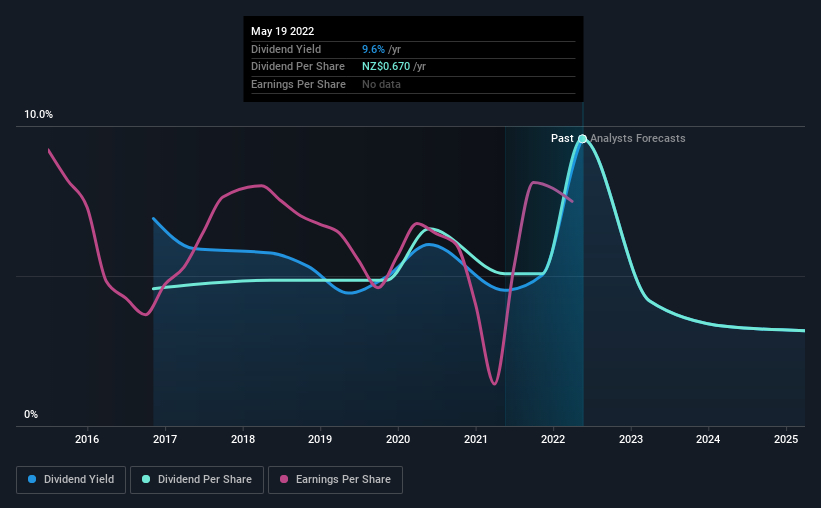Manawa Energy (NZSE:MNW) Will Pay A Larger Dividend Than Last Year At NZ$0.54
Manawa Energy Limited (NZSE:MNW) has announced that it will be increasing its dividend on the 17th of June to NZ$0.54. This will take the annual payment from 9.6% to 11% of the stock price, which is above what most companies in the industry pay.
View our latest analysis for Manawa Energy
Manawa Energy Is Paying Out More Than It Is Earning
We like to see robust dividend yields, but that doesn't matter if the payment isn't sustainable. Based on the last payment, the company wasn't making enough to cover what it was paying to shareholders. Without profits and cash flows increasing, it would be difficult for the company to continue paying the dividend at this level.
Over the next year, EPS is forecast to fall by 28.1%. If the dividend continues along the path it has been on recently, the company could be paying out more than double what it is earning, which is definitely a bit high to be sustainable going forward.
Manawa Energy's Dividend Has Lacked Consistency
Even in its relatively short history, the company has reduced the dividend at least once. If the company cuts once, it definitely isn't argument against the possibility of it cutting in the future. The first annual payment during the last 6 years was NZ$0.32 in 2016, and the most recent fiscal year payment was NZ$0.67. This implies that the company grew its distributions at a yearly rate of about 13% over that duration. Dividends have grown rapidly over this time, but with cuts in the past we are not certain that this stock will be a reliable source of income in the future.
There Isn't Much Room To Grow The Dividend
With a relatively unstable dividend, it's even more important to see if earnings per share is growing. Manawa Energy has seen EPS rising for the last five years, at 7.2% per annum. While EPS is growing at a decent rate, but future growth could be limited by the amount of earnings being paid out to shareholders.
The Dividend Could Prove To Be Unreliable
Overall, this is probably not a great income stock, even though the dividend is being raised at the moment. The payments are bit high to be considered sustainable, and the track record isn't the best. Overall, we don't think this company has the makings of a good income stock.
Market movements attest to how highly valued a consistent dividend policy is compared to one which is more unpredictable. Meanwhile, despite the importance of dividend payments, they are not the only factors our readers should know when assessing a company. For example, we've identified 3 warning signs for Manawa Energy (2 make us uncomfortable!) that you should be aware of before investing. Looking for more high-yielding dividend ideas? Try our collection of strong dividend payers.
Have feedback on this article? Concerned about the content? Get in touch with us directly. Alternatively, email editorial-team (at) simplywallst.com.
This article by Simply Wall St is general in nature. We provide commentary based on historical data and analyst forecasts only using an unbiased methodology and our articles are not intended to be financial advice. It does not constitute a recommendation to buy or sell any stock, and does not take account of your objectives, or your financial situation. We aim to bring you long-term focused analysis driven by fundamental data. Note that our analysis may not factor in the latest price-sensitive company announcements or qualitative material. Simply Wall St has no position in any stocks mentioned.

 Yahoo Finance
Yahoo Finance 
